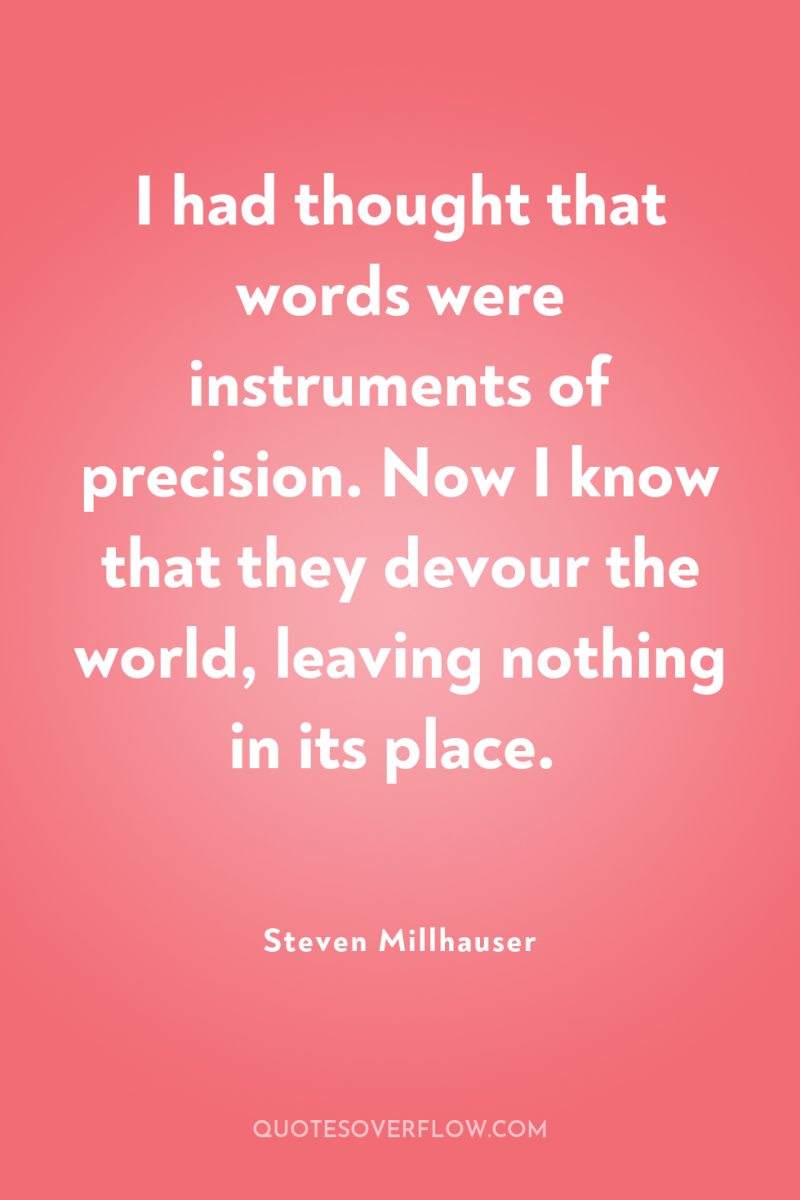
1
All words are masks and the lovelier they are, the more they are meant to conceal.Steven Millhauser

2
God pity the poor novelist.Steven Millhauser
3
That afternoon he told me that the difference between human beings and animals was that human beings were able to dream while awake. He said the purpose of books was to permit us to exercise that faculty. Art, he said, was a controlled madness… He said books weren't made of themes, which you could write essays about, but of images that inserted themselves into your brain and replaced what you were seeing with your eyes.Steven Millhauser
4
As I train myself to cast off words, as I learn to erase word-thoughts, I begin to feel a new world rising up around me, The old world of houses, rooms, trees and streets shimmers, wavers and tears away, revealing another universe as startling as fire. We are shut off from the fullness of things. Words hide the world. They blur together elements that exist apart, or they break elements into pieces bind up the world, contract it into hard little pellets of perception. But the unbound world, the world behind the world — how fluid it is, how lovely and dangerous. At rare moments of clarity, I succeed in breaking through. Then I see. I see a place where nothing is known, because nothing is shaped in advance by words. There, nothing is hidden from me. There, every object presents itself entirely, with all its being. It's as if, looking at a house, you were able to see all four sides and both roof slopes. But then, there's no “house, ” no “object, ” no form that stops at a boundary, only a stream of manifold, precise, and nameless sensations, shifting into one another, pullulating, a fullness, a flow. Stripped of words, untamed, the universe pours in on me from every direction. I become what I see. I am earth, I am air. I am all. My eyes are suns. My hair streams among the galaxies.Steven Millhauser

5
I had thought that words were instruments of precision. Now I know that they devour the world, leaving nothing in its place.Steven Millhauser

6
Ennui had more distractions far more amusing than the automatons of a watchmaker in Mühlenberg.Steven Millhauser
7
But what struck me was the book-madness of the place--books lay scattered across the unmade bed and the top of a battered-looking desk, books stood in knee-high piles on the floor, books were crammed sideways and right side up in a narrow bookcase that rose higher than my head and leaned dangerously from the wall, books sat in stacks on top of a dingy dresser. The closet door was propped open by a pile of books, and from beneath the bed a book stuck out beside the toe of a maroon slipper.Steven Millhauser
8
Art, he said, was a controlled madness... He said that books weren't made of themes, which you could write essays about, but of images that inserted themselves into your brain and replaced what you were seeing with your eyes.Steven Millhauser
9
The swirling lines of snow were composed of separate flakes, and each flake was a cluster of separate ice crystals--scientists had counted over a hundred of them in a single flake. Under the microscope each minuscule crystal, colorless and transparent, revealed a secret symmetry: six sides, the outward expression of an inward geometry of frozen molecules of water. But the real wonder was that no two crystals were precisely alike. In one of this father's camera magazines he had seen a stunning display of photomicrographs, and what was most amazing about the enlarged crystals was that each contained in its center a whole world of intricate six-sided designs, caused by microscopic air pockets. For no conceivable reason, Nature in a kind of exuberance created an inexhaustible outpouring of variations on a single form. A snowstorm was a fall of jewels, a delirium of hexagons--clearly the work of a master animator.Steven Millhauser
10
He sank back into his black-and-white world, his immobile world of inanimate drawings that had been granted the secret of motion, his death-world with its hidden gift of life. But that life was a deeply ambiguous life, a conjurer's trick, a crafty illusion based on an accidental property of the retina, which retained an image for a fraction of a second after the image was no longer present. On this frail fact was erected the entire structure of the cinema, that colossal confidence game. The animated cartoon was a far more honest expression of the cinematic illusion than the so-called realistic film, because the cartoon reveled in its own illusory nature, exulted in the impossible--indeed it claimed the impossible as its own, exalted it as its own highest end, found in impossibility, in the negation of the actual, its profoundest reason for being. The animated cartoon was nothing but the poetry of the impossible--therein lay its exhilaration and its secret melancholy. For this willful violation of the actual, while it was an intoxicating release from the constriction of things, was at the same time nothing but a delusion, an attempt to outwit mortality. As such it was doomed to failure. And yet it was desperately important to smash through the constriction of the actual, to unhinge the universe and let the impossible stream in, because otherwise--well, otherwise the world was nothing but an editorial cartoon.Steven Millhauser
11
Stories, like conjuring tricks, are invented because history is inadequate for our dreams.Steven Millhauser
12
Others saw in the trend still another instance of a disturbing tendency in the American suburb: the longing for withdrawal, for self-enclosure, for expensive isolation.Steven Millhauser
13
Franklin knew that the truth lay with the winter night: the world was silent and black-and-white.Steven Millhauser
14
After all, we were young. We were fourteen and fifteen, scornful of childhood, remote from the world of stern and ludicrous adults. We were bored, we were restless, we longed to be seized by any whim or passion and follow it to the farthest reaches of our natures. We wanted to live — to die — to burst into flame — to be transformed into angels or explosions. Only the mundane offended us, as if we secretly feared it was our destiny . By late afternoon our muscles ached, our eyelids grew heavy with obscure desires. And so we dreamed and did nothing, for what was there to do, played ping-pong and went to the beach, loafed in backyards, slept late into the morning — and always we craved adventures so extreme we could never imagine them. In the long dusks of summer we walked the suburban streets through scents of maple and cut grass, waiting for something to happen.Steven Millhauser
15
Was there a turn, a change in the atmosphere? To single out a particular moment is to distort the record, for it suggests a clear history of cause and effect that can only betray our sense of what really happened.Steven Millhauser